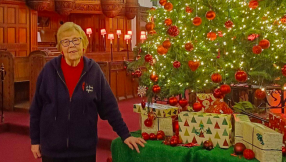More Churches express opposition to gay marriage
In their submission to the public consultation on gay marriage, Catholic bishops warn that a change in the law will lead to a “radical” and “irreversible” change in social policy with consequences that beyond the control of the Government.
They raise concerns about the welfare of children, warning that redefining marriage risks a social change that focuses primarily on the needs of couples while placing the best interests of children to “one side”.
They go on to argue that the current legal definition of marriage should be retained because of the uniqueness of the institution.
“The institution of marriage has never prevented the development of other forms of friendship or human relationship within those cultures and societies but they have never been given the name of ‘marriage’,” the bishops say.
“Marriage is therefore unique and distinct from all other human relationships.
“Marriage is about a great deal more than simply ‘love’ and commitment’ whether within a legal framework or outside of it.
“Clearly, there are many other forms of relationship which demonstrate love and commitment yet are not regarded as having equality with marriage.”
The Church in Wales said it shared the Church of England’s concerns – outlined in a separate submission yesterday – about the legal implications of the change.
“The Church in Wales is in an almost identical position to the Church of England with regard to the solemnisation of marriages,” its submission states.
“We would seek assurances that the Government would specifically include the Church in Wales in any provisions for the Church of England under the proposed legislation.”
The Church in Wales voiced its regret that the consultation focuses only on the practice of registering and recognising same-sex marriage, and does not invite comment on the principle.
“The question of why, and whether or not it is desirable to introduce the concept of marriage for same-sex couples should also be open to public consultation,” it says.
The Church outlines several criticisms of the consultation document, including “restrictive” questions and the reference throughout to an alleged “ban” on same-sex couples marrying.
“This legislation does not lift a ban; it proposes the creation of a new state, i.e. marriage between persons of the same sex,” the Church notes.
“Similarly, despite the number of jurisdictions which have already introduced same-sex marriage, it is disingenuous to say that ‘marriage for same-sex couples is not a new idea’. In the history of formally recognised social relationships it is very new indeed.”
The Church also criticises the “new and false” distinction made in the document between civil and religious marriage.
“There is no such distinction in law. There are no rights and responsibilities which apply to marriages contracted in civil ceremonies which do not apply to marriages in religious ceremonies, and vice-versa.”
Whilst the Government plans to remove the bar to same-sex couples marrying, civil partnerships will continue to be reserved for gay couples only. The Church in Wales suggested this would lead to a “new inequality”.
“It is not at all clear in what ways same-sex marriage will be different in substance from existing arrangements for civil partnerships,” it said.
“They already appear to be in all respects the same, in the rights and responsibilities conferred on the parties; and with only very minor distinctions in the methods of registration, or the reasons for dissolving the relationship.
“Nor is it clear what will be the purpose of retaining the category of civil partnership alongside same-sex marriage, especially since it is not proposed that heterosexual couples be allowed to enter into a civil partnership.
“In the context of equality of access to registered relationships, this appears to create a new inequality.”
The Church in Wales submission concludes that there is already sufficient legal provision for same-sex couples within civil partnerships.
“Arrangements for recognising and supporting these relationships are to be welcomed, but such provision already exists, and beyond raising the dangers of significant confusion and debate, the current proposals do not add to these provisions.”
The Church of England argued in its submission yesterday that there were “no obvious legal gains” to be had for gay couples.
It also raised concern that clergy would face lawsuits if they refused to host same-sex wedding ceremonies in their churches.
“It is unlikely to prove politically sustainable to prevent same-sex weddings in places of worship given that civil partnerships can already be registered there where the relevant religious authority consents.
“And there have to be serious doubts whether the proffered legal protection for churches and faiths from discrimination claims would prove durable.”
Crispin Blunt, the openly gay Tory justice minister, suggested clergy who refused to perform gay wedding ceremonies could still be taken to court despite Government assurances that they would be safeguarded.
He said: “We’re seeking to protect, indeed, proscribe religious organisations from offering gay marriage.
“That may be problematic legally, but the proposal the Government are putting forward is that marriage should be equal in the eyes of the state whether it’s between a same-sex couple or between a man and a woman. We’ll have to see what happens with that.”
The Government consultation on gay marriage closes on Thursday.













